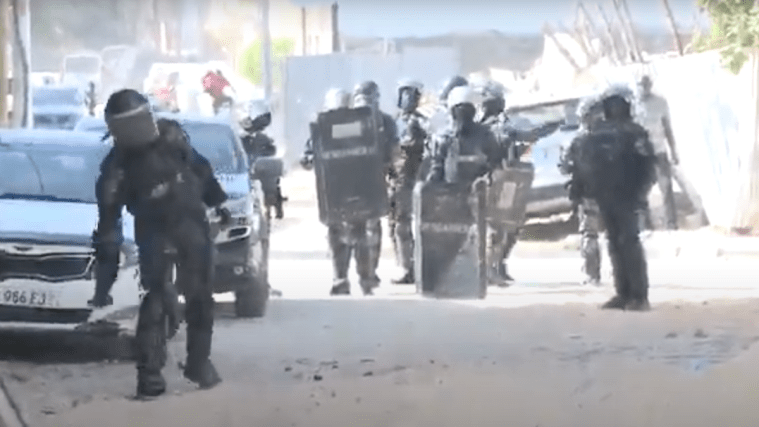The Torch is a weekly newsletter from the Committee to Protect Journalists that brings you the latest press freedom and journalist safety news from around the world. Subscribe here.
Only one month into a record election year, CPJ has already begun recording election-related attacks against the press—attempts by governments to stifle critical voices and restrict the free flow of information that is essential for voters.
Just this week authorities in Senegal suspended mobile internet access, revoked the broadcasting license of Walf TV, and detained or harassed at least four journalists. This happened a day after the government announced that the presidential election scheduled for February 25 would be indefinitely postponed.
In Pakistan, journalists were barred from coverage in some areas while mobile phone and internet services were widely disrupted on the February 8 election day. CPJ and partners in the #KeepItOn coalition monitored the situation and urged authorities to immediately reconnect Pakistan’s internet. This follows the restricting earlier this week of internet services in “sensitive” polling booths in the Balochistan province and blocking access to the investigative news website FactFocus.
Around the world, CPJ has repeatedly documented how internet shutdowns threaten press freedom and journalists’ safety. Journalists play a vital role in helping the public understand what is happening, and their ability to report, including via mobile internet, must be protected, not censored.
⚡️ CPJ offers guidance for journalists on how to prepare for and respond to internet shutdowns.
Separately this week, CPJ is excited to announce a new partnership with Forbidden Stories to strengthen journalist safety. As part of the new initiative, CPJ will provide safety consultations to journalists working with Forbidden Stories, while journalists seeking CPJ’s assistance will be able to use Forbidden Stories’ “SafeBox Network,” which allows journalists at risk to share documents and information via a secure platform.
🗓️ Upcoming: Next Thursday, January 18, CPJ will release our annual report on worldwide killings of journalists. Please email [email protected] to request advance copies of the report; CPJ experts are also available for interviews.
- “Severe fair trial violations” reported in José Rubén Zamora’s case
- Moscow police detain around 20 journalists during protest by soldiers’ wives
- CPJ, partners call on European Commission to act on press freedom in Greece
- Turkish journalist Azim Deniz shot, wounded in Kayseri; Mahmut Altıntaş detained, says police beat him
- Kyrgyzstan upholds detention of 11 journalists
- CPJ condemns acquittal of those involved in the 1999 murder of Serbian journalist Slavko Ćuruvija
- CPJ alarmed by extended communications blackout in Sudan
- Ghanaian journalist Mohammed Aminu Alabira says NPP parliamentarian, party supporters punched and kicked him
- Iranian reporter Mehdi Afshar-Nik held incommunicado since January 31; journalist Nasrin Hassani begins seven-month prison sentence
- CPJ calls on China to reverse death sentence against Yang Hengjun
- Hong Kong court finds two journalists guilty of unlawfully entering legislature during 2019 protests
Spotlight

Data privacy for journalists is critical for them to do their work. But this week, we saw the unprecedented use of spyware on journalists and others in Jordan, while in Mexico—where journalist murders abound—we reported the massive government leak of personal information belonging to hundreds of journalists.
Between 2020 and 2023, at least 16 journalists and media workers in Jordan were targeted by Pegasus spyware, along with 19 other individuals, according to a report by AccessNow, Citizen Lab, and local partners. CPJ spoke with four journalists whose devices were hacked, including Palestinian-American journalist and International Press Freedom Awardee Daoud Kuttab. He was targeted by Pegasus spyware multiple times, according to the report.
“I will not be intimidated, and I will not censor myself,” Kuttab told CPJ. “It is highly irritating to be spied on, but that also comes with the job nowadays.”
In Mexico, the personal information of at least 324 journalists, who had registered with the office of the Mexican presidency to cover President Andrés Manuel López Obrador’s live weekday morning broadcasts, was posted on a website.
Daniel Flores, a reporter with news website Reporte Índigo, and one of the journalists whose personal information was leaked, told CPJ that the government “had not informed the reporters whose information was leaked until it was already widely publicized in national and international media.”
💡 Separately this week: Botswana politicians doxxed two journalists by posting their personal data online, and CPJ urged Kazakh authorities to investigate cyberattacks on media.
🔎 Find more information and safety resources about digital surveillance in our January 25 edition of the Torch.
In February 2023, Nicaragua shocked the world when it suddenly released over 200 political prisoners—including seven Nicaraguan journalists and media workers—and deported them to the U.S. One year ago tomorrow, CPJ met them at the airport and spoke with two journalists, Juan Lorenzo Holmann and Miguel Mendoza Urbina, about their liberation that, nonetheless, rendered them stateless.
Our interviews with Holmann and Mendoza are also available in Spanish:
➡️ Juan Lorenzo Holmann de La Prensa: “Me di la vuelta y me despedí de Nicaragua”
➡️ Periodista nicaragüense Miguel Mendoza, sobre su deportación agridulce de su país “secuestrado”
What we are reading (and listening to)
- Man Accused of Killing Journalist in Maharashtra Received Payment from Refinery: Investigation — Phineas Rueckert, Forbidden Stories
- 🎙️ What Works in Defeating Workplace Sexual Harassment — The Hidden Economics of Remarkable Women (HERO)
- IPI Executive Board: Stop the killing of journalists in Gaza — International Press Institute
- How one Nigerian newspaper took on outrage fatigue — Adaobi Tricia Nwaubani, Columbia Journalism Review
- Winning the Battle of Ideas: Exposing Global Authoritarian Narratives and Revitalizing Democratic Principles — Joseph Siegle, National Endowment for Democracy
Explore our legal resources for journalists.
Do you have an Amazon Alexa-enabled device? Enable CPJ's flash briefing skill to stay up to date with the latest press freedom news from around the world.
